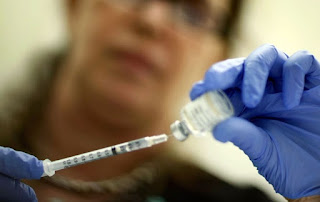POLIO VACCINE FROM PLANT CAN ERADICATE IT FROM WORLD
Prof Dr,DRAM,HIV /AIDS,HEPATITIS ,SEX DISEASES & WEAKNESS expert,New Delhi,India, +917838059592
In a breakthrough, scientists have used plants to produce a new vaccine against the polio virus, a finding which can pave the way for global eradication of the disease.The novel vaccine was produced with a method that uses virus-like particles (VLPs) -- non-pathogenic mimics of the polio virus which are grown in plants.
Genes that carry information to produce VLPs are infiltrated into the plant tissues. The host plant then reproduces large quantities of them using its own protein expression mechanisms."This is an incredible collaboration involving plant science, animal virology and structural biology. The question for us now is how to scale it up -- we don't want to stop at a lab technique," said George Lomonossoff, Professor from the John Innes Centre -- a UK-based independent research organisation.
VLPs look like viruses but are non-infectious. They have been biologically engineered so they do not contain the nucleic acid that allows viruses to replicate.This means that they mimic the behaviour of the virus, stimulating the immune system to respond without causing an infection of poliomyelitis, the researchers said.
 Laboratory tests demonstrated that the polio virus mimics provided animals with immunity from the disease paving the way for human vaccines to be produced by plants on a major scale with the input of pharmaceutical industry collaborators.Polio virus destroys motor neurons in the central nervous system causing paralysis or even death.
Laboratory tests demonstrated that the polio virus mimics provided animals with immunity from the disease paving the way for human vaccines to be produced by plants on a major scale with the input of pharmaceutical industry collaborators.Polio virus destroys motor neurons in the central nervous system causing paralysis or even death.
The Global Polio Eradication Initiative led by the World Health Organisation has resulted in 99 per cent fewer cases in the past 30 years. However, the current vaccines require the production of huge quantities of live polio virus, which increases the risk of accidental re-introductions.
The successful development of VLPs not only holds promise for the production of vaccines for polio but it could also become a frontline diagnostic resource in producing vaccines against other viral outbreaks, the researchers said.
- Kidney stones universally present hazard in north india,dillution by water prevent it
- Steroid and placebo effect equally for mild persisting asthma with low sputum eosinophils
- Government wants to fix public healthcare staff shortages with ayush docs: will it work?
- Plea in hc for payment of salaries of edmc, north mcd teachers and doctors
- 7 indian pharma companies named in us lawsuit over inflating generic drug prices
- Woman in up dies after explosion in her mouth during treatment,what is diagnosis?
- Woman in up dies after explosion in her mouth during treatment,what is diagnosis?
- Woman in up dies after explosion in her mouth during treatment,what is diagnosis?
- Air pollution ! mothers organising rally in london,anaesthetist choosing gas,will india follow?
- Cardiac arrest is always not sudden as understood -a study

 Comments (
Comments ( Category (
Category ( Views (
Views (